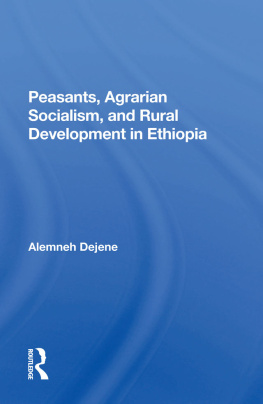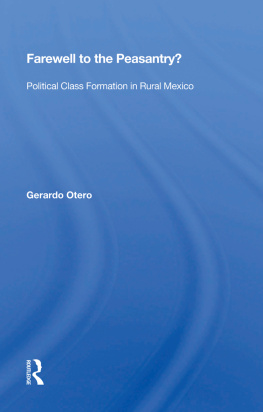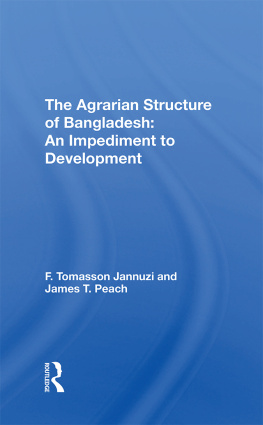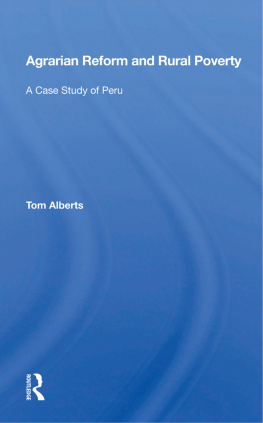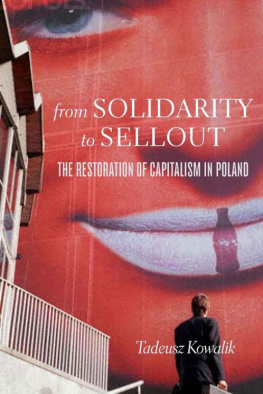Reluctant Socialists, Rural Entrepreneurs
Class, Culture, and the Polish State
Studies in the Ethnographic Imagination
John Comaroff, Pierre Bourdieu, and Maurice Bloch, Series Editors
Reluctant Socialists, Rural Entrepreneurs: Class, Culture, and the Polish State Carole Nagengast
The Power of Sentiment: Love, Hierarchy, and the Jamaican Family Elite Lisa Douglass
Ethnography and the Historical Imagination John Comaroff and Jean Comaroff
FORTHCOMING
Knowing Practice: The Clinical Encounter of Chinese Medicine Judith Farquhar
New Worlds from Fragments: Film, Ethnography, and the Representation of Northwest Coast Cultures Rosalind C. Morris
Siva and Her Sisters: Gender, Caste, and Class in Rural South India Karin Kapadia
Reluctant Socialists, Rural Entrepreneurs
Class, Culture, and the Polish State
Carole Nagengast
The map of Poland on p. xvi is reprinted from Jack A. Goldstone, Ted Robert Gurr, and Farrokh Moshiri, eds., Revolutions of the Late Twentieth Century (Boulder: Westview Press, 1991), p. 137. Copyright 1991 by Jack A. Goldstone. Used with permission.
First published 1991 by Westview Press
Published 2019 by Routledge
52 Vanderbilt Avenue, New York, NY 10017
2 Park Square, Milton Park, Abingdon, Oxon OX14 4RN
Routledge is an imprint of the Taylor & Francis Group, an informa business
Copyright 1991 by Taylor & Francis
All rights reserved. No part of this book may be reprinted or reproduced or utilised in any form or by any electronic, mechanical, or other means, now known or hereafter invented, including photocopying and recording, or in any information storage or retrieval system, without permission in writing from the publishers.
Notice:
Product or corporate names may be trademarks or registered trademarks, and are used only for identification and explanation without intent to infringe.
Library of Congress Cataloging-in-Publication Data
Nagengast, Carole.
Reluctant socialists, rural entrepreneurs: class, culture, and
the Polish state / Carole Nagengast.
p. cm. (Studies in the ethnographic imagination)
Includes bibliographical references.
ISBN 0-8133-8053-7. 0-8133-1932-3(pbk.)
1. PolandRural conditions. 2. AgricultureEconomic aspectsPoland.
3. Social classesPoland. 4. PolandPopulation, Rural.
I. Title. II. Series
HN538.5.N34 1991
307.72'09438dc20 91-27458
CIP
ISBN 13: 978-0-367-28559-3 (hbk)
To my grandparents Michael and Katherine Malek, who taught me to love "the old country"
I FIRST VISITED WOLA PAWSKA, the small rural farming community in Poland upon which many conclusions in this book are based, in 1977. The purpose of this first trip was to ascertain if indeed anthropological research of the sort I had in mind was going to be possible in "Communist" Poland. Having found a positive response (at both the local and national levels), I returned with my three children, Mary Anne, John, and Claire Connelly, in fall 1978. We remained in the village, staying with a village family, until almost the end of 1979. My partner and friend, Michael Kearney, joined us for four months during the dead of winter 1979, rendering moral support and bringing welcome material resources, including replenishment for our already depleted supply of cold medicines and a shortwave radio that gave us access to the BBC, Radio Free Europe, Radio Moscow, and Radio Beijing, which caused us a certain amount of consternation when we compared contrasting versions of, for example, the Three Mile Island disaster, the incidents at Jonesville, and other major events of that year.
In Poland, I was witness to the election of Karol Wojtya as Pope John Paul II and, more important for the purposes of this book, to the events and processes that led to the eruption of Solidarity onto the national and international scene less than a year after my departure. I made two subsequent visits to Poland, one in 1988 and another in 1990, during a period that was, of course, especially significant for Poland, indeed for all of Eastern Europe and the rest of the world. On the surface, this book is not about those events but about farmerspeasants, some might call them. These are people, however, whose history and whose lives figured in the dramatic events of the past decade in sometimes unexpected ways.
As a resident of Wola Pawska, I have been both participant in and observer of daily life in most settings, including parties, weddings, funerals, and births and one complete agricultural cycle: plowing, planting, cultivation, harvesting, and marketing. There is not an agricultural chore that I have not participated in: I have plowed, sowed, harvested, threshed, dug potatoes, spread manure, milked cows, and helped to slaughter more pigs than bear remembering in order to make sausage and smoke ham. I was not, in fact, especially competent in some of these tasks (I never did master milking), but people put up with me with amazing grace and, as time went by, I was able to render significant help. My children quickly learned basic Polish, attended the local school for a full academic year, and within months were incorporated into the social life of the children and adolescents. They were also my informal field assistants and collaborators, especially in producing accounts of the village school system and the social groups of children. As the parent of school-age children and perhaps because of my own Polish peasant ancestry, I was fitted into the social fabric of Wola Pawska and to an important extent into that of the adjoining and larger village of Rzdzienowice. In 1978 and 1979 I recorded agricultural statistics and did extensive oral histories and interviews and a complete demographic survey. I was given access to the archives of Wola Pawska (the church records of marriages, baptisms, and deaths), the complete records of agricultural sales to the local authorities, purchases of fertilizers and other inputs, and the bank records of loans and credits. I copied or photographed most of these documents. I also conducted a number of interviews with local authorities and a few with other officials of the state as I encountered them on my monthly trips to Krakw and two trips to Warsaw. Later visits to Poland, during which I was unaccompanied by my children, were necessarily briefer and only for gathering data; though done in a somewhat less formal style, these visits nonetheless provided historical depth and have been crucial to my understanding.
The research in Poland would not have been possible without the assistance of many people, most notably that of the people of Wola Pawska and Rzdzienowice. To those who prefer to remain unnamed but who gave me and my children a home in all senses of the word during 1978 and 1979 and hosted me again on later trips, I shall always be grateful for their hospitality and for their warmth and graciousness beyond what anyone could ever expect anywhere.
My official status as a visiting scholar at Jagiellonian University in Krakw, arranged by the International Research and Exchanges Board (IREX), opened doors that might otherwise have remained forever closed, IREX, the National Science Foundation, and the Chancellor's Patent Fund of the University of California-Riverside, financed my original field work. Their help is acknowledged with gratitude. John Comaroff, Martha Lampland, and Jean Lave have read and commented on this and earlier versions of the manuscript, and Michael Kearney on more than he or I can remember. Special thanks to him and to Kellie Masterson of Westview Press, who guided this project through the shoals. The usual disclaimers pertain!


